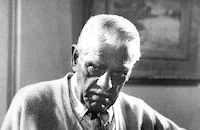Charlie Chan at the Opera
Brief Synopsis
Cast & Crew
H. Bruce Humberstone
Warner Oland
Boris Karloff
Keye Luke
Charlotte Henry
Thomas Beck
Film Details
Technical Specs

Synopsis
At the Rockland State Sanitorium, Gravelle, an opera singing amnesiac, regains his memory when he sees a newspaper article about prima donna Lilli Rochelle, then kills a guard to escape. Inspector Regan calls Charlie Chan in on the case, and as they are in his office discussing it, Lilli comes in, accompanied by her lover and fellow singer, Enrico Barelli, to complain about a threat stating she will die that night. Chan agrees to go to the opera that night, along with Sergeant Kelly, to investigate. Later at the theater, Phil Childers and his girl friend Kitty try to see Lilli but are turned away by Kelly just as Regan and Chan arrive and hear Lilli's husband Whitely and Enrico fighting over Lilli. Meanwhile, in the dressing room of Enrico's wife Anita, Gravelle appears, and although Anita is terrified because he was presumed dead in a theater fire years ago, she agrees to keep his presence a secret while he carries out his plan of singing Enrico's role on stage. Gravelle then menaces Enrico, who, along with Lilli, locked Gravelle in the burning theater, and soon it is Gravelle rather than Enrico who joins Lilli on stage for their duet. Lilli recognizes Gravelle's voice and faints after she leaves the stage. After Whitely carries Lilli off, the others rush to Enrico's room, only to find that he has been stabbed. While the others search for Gravelle, Phil enters Lilli's room and discovers that she is also dead. Whitely comes in and has Phil arrested, but when Chan questions Phil and Kitty, they tell him that Kitty is Lilli's daughter from her previous marriage to Gravelle and that Lilli refused to acknowledge Kitty in order to keep her past a secret. The young lovers were there to ask Lilli for her permission to marry, as Kitty is underage. Gravelle, who did not recognize Kitty, is stunned as he overhears. Later, Phil goes to see Regan, leaving Kitty alone, and Gravelle comes in. He gently questions her and plays the piano for her, but she does not remember him and faints from fright. Chan enters, and after Gravelle tells him about Lilli and Enrico's attempt to kill him, Chan flatters him into singing again. Chan arranges to have Anita sing Lilli's role, and during the duet, which involves Gravelle's character stabbing Anita's character, Anita becomes so scared that a police officer shoots Gravelle. Chan then demonstrates that Gravelle's knife is a prop and could not have been used in the murders. He explains that Anita was the only one who had access to Enrico and Lilli when they were alone and unconscious, and that she was also the only one who knew Gravelle was there and could therefore frame him. Anita confesses that jealousy drove her to kill her husband and his lover, and after she is taken away, Chan convinces Kitty to comfort injured Gravelle, thereby saving his life.

Director

H. Bruce Humberstone
Cast

Warner Oland

Boris Karloff

Keye Luke

Charlotte Henry

Thomas Beck
Margaret Irving

Gregory Gaye
Nedda Harrington

Frank Conroy
Guy Usher

William Demarest
Maurice Cass
Tom Mcguire
Crew
Lucien Andriot
Charles S. Belden
Duncan Cramer
Lewis Creber
Scott Darling
Herschel
Samuel Kaylin
William Kernell
Harry M. Leonard
Oscar Levant
George Leverett
Charles Maxwell
Bess Meredyth
Sol Michaels
John Stone
Alex Troffey

Film Details
Technical Specs

Quotes
I'm stage manager here and this opera's going on tonight even if Frankenstein walks in.- Mr. Arnold
Small things sometimes tell large story.- Charlie Chan
Trivia
Notes
The film's title card reads: "Twentieth Century-Fox presents Warner Oland vs. Boris Karloff in Charlie Chan at the Opera." Although contemporary reviews call Margaret Irving's character "Lucretia Barrelli," she is called "Anita Barelli" in the film. A Motion Picture Daily news item noted that the picture was banned in Germany for having "too many murders." A Hollywood Reporter news item stated that public response to the film's preview was so positive that Twentieth Century-Fox planned to up the production and advertising budgets for the Charlie Chan series, and that future films would see "Warner Oland co-starred with a top name opposite." The first actor the studio was said to be approaching to star with Oland was Peter Lorre. According to another Hollywood Reporter news item, this film marked the first time that a DeBrie camera, which was lighter and more quiet than other models, was used in the United States. According to modern sources, H. Bruce Humberstone borrowed some of the sets from Café Metropole (see AFI Catalog of Feature Films, 1931-40; F3.0551) for this film. Oscar Levant, in his autobiographical writings, states that he was assigned to write an operatic sequence that could take advantage of a Mephistophelian costume that had been created for Lawrence Tibbett in a previous Twentieth Century-Fox film (presumably Under Your Spell, see AFI Catalog of Feature Films, 1931-40; F3.4856). Levant also relates that the words for the opera were written originally in English by William Kernell and then translated into Italian by "studio linguists." For additional information on the series, please consult the Series Index and see the entry below for Charlie Chan Carries On.












